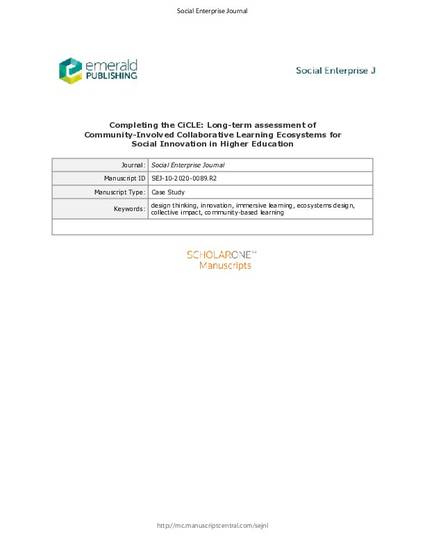
Article
Completing the CiCLE: Long-term assessment of Community-Involved Collaborative Learning Ecosystems for Social Innovation in Higher Education
Social Enterprise Journal
(2021)
Abstract
Highlight the benefits and challenges of immersive, design thinking, and community-engaged pedagogies for supporting social innovation within higher education; assess the impact of such approaches across stakeholder groups through long-term retrospective analysis of transdisciplinary and cross-stakeholder work; offer an approach to ecosystems design and analysis that accounts for complex system dynamics in higher education partnerships.
The study uses constructivist grounded theory (Charmaz and Belgrave, 2012) to create a long-term systemic analysis of university innovation efforts. Researchers analysed 37 semi-structured interviews across key stakeholders involved in the design and implementation of the Design Thinking Studio in Social Innovation. Interview subjects include alumni (students), faculty, community partners, and administrators. Interviews were coded using constant comparative coding (Mills et al., 2006) to develop and analyse themes. The study includes situated perspectives from the authors who offer their subjective relationship to the Studio’s development.
This paper assesses the outcomes and design of a transdisciplinary cross-stakeholder social innovation program and extends prior research on the potential and challenges of design thinking and immersive pedagogies for supporting service-learning and community engagement (SLCE) practices within higher education. Qualitative interview results reveal how time, resources, and other structural and systemic factors operate across stakeholder groups. The findings address a gap in SLCE and social innovation literature by situating community learning within pedagogical interventions constructed not only for the benefit of students but for community members. We conclude that the research on social innovation in higher education could benefit from a more intentional examination of longitudinal effects of innovative pedagogical environments across a broad range of stakeholder perspectives and contexts.
Social innovation in higher education could benefit from harnessing lessons from collective impact and ecosystem design frameworks. In addition, we argue higher education institutions should commit to studying longitudinal effects of innovative pedagogical environments across multiple stakeholder perspectives and contexts. This study closes these gaps by advancing an ecosystems model for long-term and longitudinal assessment that captures the impact of such approaches across stakeholder groups and developing an approach to designing and assessing community-involved collaborative learning ecosystems (CiCLE).
Disciplines
Publication Date
Spring 2021
DOI
10.1108/SEJ-10-2020-0089
Publisher Statement
Emerald allows authors to deposit their AAM under the Creative Commons Attribution Non-commercial International Licence 4.0 (CC BY-NC 4.0). To do this, the deposit must clearly state that the AAM is deposited under this licence and that any reuse is allowed in accordance with the terms outlined by the licence. To reuse the AAM for commercial purposes, permission should be sought by contacting permissions@emeraldinsight.com.
For the sake of clarity, commercial usage would be considered as, but not limited to:
o Copying or downloading AAMs for further distribution for a fee;
o Any use of the AAM in conjunction with advertising;
o Any use of the AAM by for promotional purposes by for-profit organisations;
o Any use that would confer monetary reward, commercial gain or commercial exploitation.
Emerald appreciates that some authors may not wish to use the CC BY-NC licence; in this case, you should deposit the AAM and include the copyright line of the published article. Should you have any questions about our licensing policies, please contact permissions@emeraldinsight.com.
Citation Information
Danielle Lake. "Completing the CiCLE: Long-term assessment of Community-Involved Collaborative Learning Ecosystems for Social Innovation in Higher Education" Social Enterprise Journal (2021) Available at: http://works.bepress.com/danielle_lake/85/
